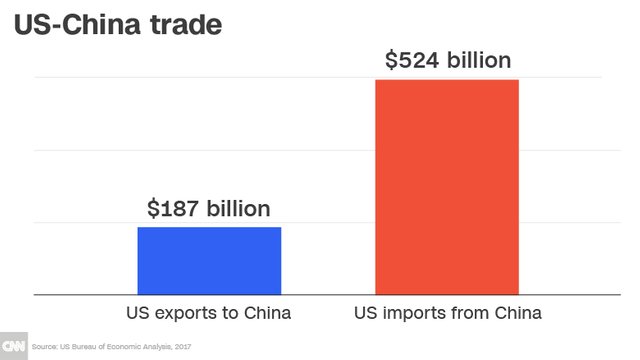American businesses brace for pain from trade fight with China
President Donald Trump's tariffs on Chinese goods are intended to help American companies that have been hurt by Beijing's industrial policies.
But in the short term, at least, many American businesses may be the ones feeling pain.
Deals are in limbo. Companies say critical supplies they need to make products could jump in price. And multinational corporations worry about their future ability to do business in China -- a massive market.
On Friday, the Trump administration said it will impose a 25% tariff on $50 billion of Chinese exports. China retaliated almost immediately and said the United States had "launched a trade war."
The Trump tariffs, which the US government says are punishment for intellectual property theft, will be enacted in two waves. More than 800 exports, about $34 billion worth, will be subject to tariffs starting July 6. Another 280 or so still need to undergo a public comment period, and will take effect later.
China said it would respond with retaliatory tariffs on American goods worth $34 billion, including agricultural products, cars and seafood. They will also be enacted on July 6.
The announcements immediately sent businesses and industry groups scrambling to figure out if items in their supply chains would be targeted, and how higher costs from tariffs could affect their bottom lines. A wide range of companies could be affected, from chipmakers to aviation giants like Boeing.
Related: China: 'The US has launched a trade war'
Chipmakers scrambling
The Semiconductor Industry Association, which represents major American chipmakers including Intel (INTC) and Qualcomm (QCOM), said it was alarmed to find the US government was now considering tariffs on computer chips imported from China.
US companies often send mostly finished chips to China for assembly, testing and packaging. They could then face tariffs when these chips are shipped back in to the country.
"While the US semiconductor industry shares the Trump administration's concerns about China's forced technology transfer and intellectual property practices, the proposed imposition of tariffs on semiconductors from China, most of which are actually researched, designed, and manufactured in the US, is counterproductive," the group said in a statement.
San Diego-based Qualcomm also still needs China's approval for its $44 billion purchase of NXP Semiconductors, a Dutch company.

The deal, first announced in October 2016, has been held up for months amid trade talks between the United States and China. Qualcomm already has a green light from regulators in eight other jurisdictions, including the European Union and South Korea, and is just waiting on Beijing.
The deal is likely to be stuck on regulatory hold a bit longer, according to Paul Triolo, who specializes in global technology policy at Eurasia Group.
Approval for the merger has been linked to US relief for ZTE (ZTCOF), the Chinese phone and telecom equipment maker that was crippled by a US export ban issued earlier this spring. The Trump administration earlier this month cut a deal with ZTE, but the agreement to save the company has faced resistance from lawmakers in Congress, who argue the ban should stay in place because ZTE poses a security threat.
"There is still a desire on both sides to remove both the ZTE and Qualcomm [deals] from the already complex equation, but political pressures on both sides, and a serious escalatory spiral in the relationship, could spell trouble for both deals," Triolo said.